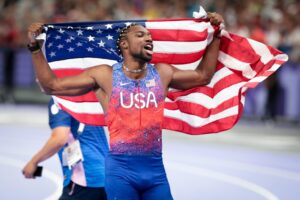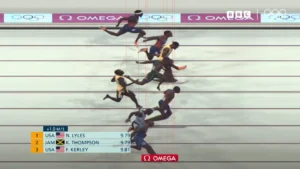
The 2024 Summer Olympics, held in Paris, witnessed a 100m final that will be remembered for ages. Noah Lyles, the American sprinting sensation, secured his place in history in an extraordinary finish that saw his torso determine the outcome in one of the most thrilling and closely contested races ever seen.
The starting line-up for the final was a collection of the world’s fastest men. Alongside Lyles was Fred Kerley, another American sprinter with a penchant for high-stakes performances. The Jamaican duo of Yohan Blake and Oblique Seville were also in the mix, bringing with them the rich legacy of Jamaican sprinting excellence. From Africa, South African Akani Simbine and Nigerian Enoch Adegoke had been in fine form, while European hopes rested on the shoulders of Italy’s Lamont Marcell Jacobs, the reigning Olympic champion from Tokyo 2020.
Each athlete had their unique strengths. Lyles was known for his explosive speed and strong finishes. Kerley brought raw power and consistent performances. Blake, a veteran, had the experience and the tenacity. Seville and the others had youth and determination on their side. The stage was set for an epic showdown.
 Photo credit: BBC Sport
Photo credit: BBC Sport
As the athletes settled into their blocks, the atmosphere in the stadium was electric. The crowd fell silent in anticipation. The starter’s pistol cracked through the air, and the sprinters exploded off the blocks.
Lyles had a decent start, though not the best. Fred Kerley surged ahead with his powerful strides, gaining an early lead. Blake and Seville were hot on his heels, with Lyles trailing slightly behind. At the 50m mark, it seemed like anyone’s race. The sprinters were almost neck and neck, each pushing their bodies to the limit.
In the final 30 meters, Lyles began to close the gap. His powerful drive and impeccable form allowed him to gain ground on Kerley. With every stride, the tension mounted. The crowd was on its feet, roaring in support of the athletes. As they approached the finish line, it was too close to call.
The photo finish of the men’s 100m final

Photo credit: [Getty Images]
In the last few meters, it all came down to a photo finish. Lyles, in a desperate lunge, threw his torso forward, a move that ultimately decided the race. The athletes crossed the finish line almost simultaneously, but it was Lyles’ torso that broke the plane first.
The photo finish was scrutinized intensely. The difference was minuscule, but clear: Noah Lyles had won the gold medal by the narrowest of margins. His time was a blistering 9.83 seconds, just a hundredth of a second ahead of Fred Kerley, who clocked 9.84. Yohan Blake secured the bronze with a time of 9.89 seconds, narrowly edging out Seville, who finished fourth.
Lyles building legacy with each global gold
Lyles has long positioned himself as Usain Bolt’s successor, blending on-track performance with off-track flair in his quest to become men’s athletics’ next superstar.
Lyles has expressed his goal to shatter the long-standing 100m and 200m records set by Jamaica’s eight-time Olympic champion Bolt, who retired in 2017.
The American has also stated that he will try for four gold medals in Paris by adding the men’s 4x400m relay to his schedule, having won the world 100m, 200m, and 4x100m titles in Budapest a year ago.
Lyles, a three-time defending world champion in the event, will next compete for the Olympic 200m title, having finished third in his Games debut in Tokyo three years ago.
“Lyles had a bad Tokyo and since then he’s really been looking for big moments,” said Johnson.
“He wants to be a global superstar. He talks about Usain Bolt and the type of person he was.
“He’s talked about his sport and voiced his frustration about how it doesn’t give you that platform.”
It’s been 16 years since Bolt cruised to the first of his three Olympic 100m gold medals in Beijing, showboating as he crossed the line but still posting a world record 9.69, which he improved to the still-standing 9.58 mark in 2009.
Lyles has yet to come close to that time, racing under 9.80 for the first time to win on Sunday night, and his 200m best of 19.31 is also behind Bolt’s (19.19).
But, like the Jamaican, Lyles competes on the sport’s biggest stages, and he continues to win global gold medals at an impressive rate.
“Noah Lyles is able to back it up,” Olympic heptathlon champion Denise Lewis said on BBC TV.
“He has been amplifying the need for people to take this sport more seriously, deliver and respect the athletes for what they deliver, which is sensational entertainment every single time.
“To do this here, with the amphitheatre of the lights, the drama, everything, is just brilliant.”
Johnson added: “He is here to create a legacy and he has put the first stamp down on that legacy by taking this title in such imperious fashion.”








Your article helped me a lot, is there any more related content? Thanks!
I don’t think the title of your article matches the content lol. Just kidding, mainly because I had some doubts after reading the article.
BusinessIraq.com leverages robust data and statistics to support its reporting. We provide accurate and detailed information on key economic indicators, market trends, and business performance. Access detailed charts, graphs, and tables for a deeper understanding of Iraqi business realities. Reliable, verifiable data underpins all reporting for the informed user.
x5dazx